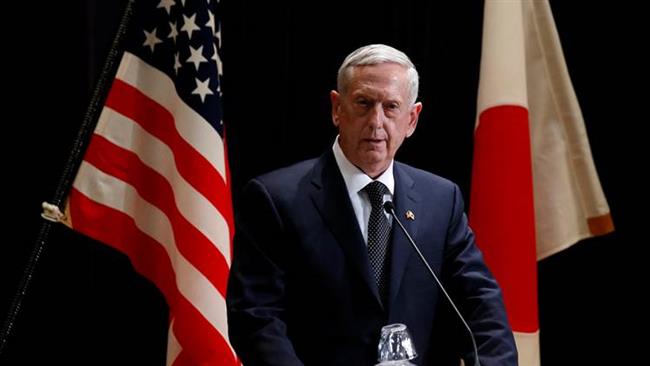Russia, China refusing to submit to US world order: Analyst
Russia and China are threatening America's so-called international order by challenging US military and economic dominance and refusing to submit to Washington’s global policies, says a political analyst in California.
US Secretary of Defense James Mattis believes “the United States has some sort of eternal right to dominate the world’s energy resources and serve as the world’s policeman and that China and Russia have a duty to serve as vassal states of the United States,” said Scott Bennett, a former US Army psychological warfare officer.
“This has been a long-standing ideological delusion within the US military and political apparatus,” Bennett told Press TV on Tuesday.
“The US has continually pursued the plan to dominate the world’s natural resources by eliminating the existing political regimes and setting-up controlled balkanized countries and vassal states,” he added.
“Russia, Iran and China represent the last threats because they are refusing to submit to that order.”
Mattis has warned that Russia and China are challenging America’s military dominance with technological advances, “placing the international order under assault."
Mattis made the statement to the US House of Representatives Armed Services Committee on Monday as part of his testimony at a hearing on the Defense Department's 2018 budget request.
Read More:
"A return to great power competition, marked by a resurgent and more aggressive Russian Federation and a rising, more confident, and assertive China, places the international order under assault," the Pentagon chief said.
He said the US military dominance in sea, land and air was being threatened with Russian and Chinese technological advances.
Mattis also said there was no indication that Russian President Vladimir Putin wanted a positive relationship with the United States, saying it had chosen to be a “strategic competitor.”
Mattis attended the wide-ranging hearing with the US Joint Chiefs of Staff Joseph Dunford, who said the United States had an adversarial relationship with Russia.
Washington and Moscow have a number of diverging interests, including in Syria and Ukraine.
Latest ballots polls show Harris, Trump tied as voting continues
UNRWA warns of humanitarian collapse in Gaza
'Hello my enemies': Lebanese journalist on Israeli threats and his resolve to continue
Outrage in France as MP proposes bill to ban criticism of Israel
VIDEO | The strategy of Hezbollah in war
Israeli military withdraws several brigades from southern Lebanon: Report
48-year-old Palestinian man serving 48 life terms completes 22 years in Israeli jails
From MKO to Tondar, how Germany became safe haven for anti-Iran terror groups














 This makes it easy to access the Press TV website
This makes it easy to access the Press TV website